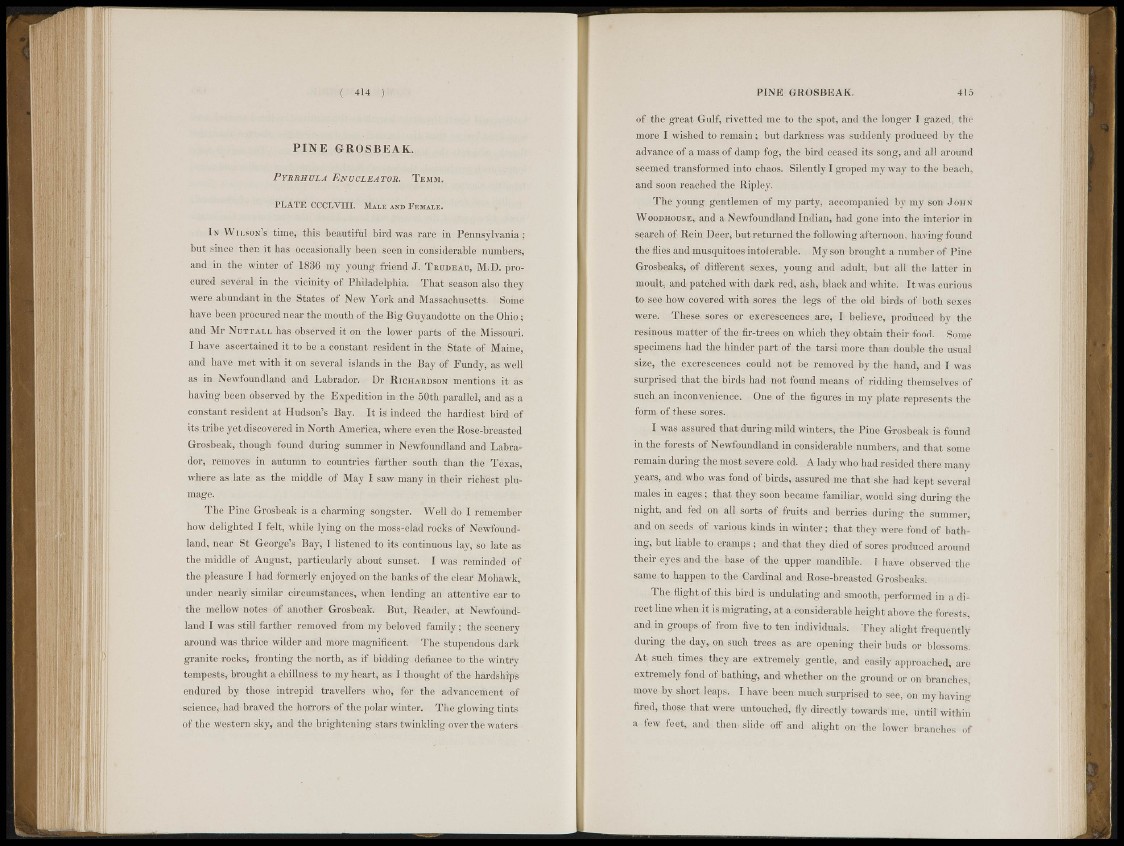
( ' • ' 4 1 4 %
P I N K GROSBK&.K.
I'YRIUIVLA KNUCI.KATOR. TEMM.
I'l.ATj? CCCI.Viri. fc's-ASD T-V..«••-.
I n VVu.sox\ time,, this beautiful bird was rare in Pennsylvania:
but since then i t lias occasionally ,)>#en seen i;i eonisidorable numbers,
and iu the .winter of 18-3Bniy yoiityfi friend J. TrddeAu, M.I), pro
eured si-voraJi iii^t 1»<; -^eiMityjf Philadelphia. That season also they
were abundant in the States of KFsw York and Massachusetts. 801110
have been |irwiir<!ii near the mouth ¿(j the Big .©uyaniotte on the Ohio?
and Mr N b t t a l l has: observed it on the lower parts, of. the Missouri.
I have ascertained it to be a constant resident in the State of Maine,
and iiavo mot with it on several islands in the Bay of I-imdy, as mi !
as in Newfoundland and Labrador. L)r Richardson- mentions it as
having been observed by the Expedition in the 50th parallel, and « a
fiigstant resident at Hudson's Hay. U ¿ i indeed the hardiest bird of
its.tribe yet discovered in North Ameiica, where own. the Kose-hroa.sted
Grosbeak, though found during, summer in Newfoundland and Labrador,
removes« in autumn :ti> countries farther south than the Tteas,
wjtere as late! as the- middle of Mags I saw many in their richest plu
mage. •
The Pine 'Grosbeak is a charming songster, Wsll do 'I remember
how delighted I felt, while lying on the moiwerfa'd' rocks of Newfoundland,
near SB Goofgo's Bay, I listened to it." continuous lay; so late as
the middle of August, particularly about sunset. X was reminded of
the pleasure I had formerly enjoyed'on the banks of (he clour Mohawk,
under nearly similar eiivumstatiees, when lending an attentive: ear to
the mellow notes of another: Grosbeak. Biit, Header, at Newfoutcdt
land I wa.-' still farther removed frotu my beloved family ; theis&enery
around was thriqe-wilder and more magnificent. The stupendous dark
granite rocks? fronting ftsmorth, as if bidding defiance to the wintry
tempests, brought a ChillntSSJ to my heart, as I thought of the hardships
midured by those Intrepid travellers who, for the advancement of
science?- had braved the horrors, of the polar winter. The glowing tints
of the western sky, and the brightening stars twinkling over the waters
P I N E GROSBEAK. 415
of the great Gulf, rivotted iu,e to the spot, and the longer I gazed the
more X wished .|0 remain; but darkness was suddenly produced by the
advance, of a mass of damp tog, the bird ceased its song, and all around
seemed, transformed into chaos. Silently I groped my way to the beach,
and soon reached the Ripley.
The young gentlemen of my party, accompanied by my son JOHN
Woodhousk, and a Newfoundland Indian, had gone into the interior in
search of Rein IJeer, but returned the following afternoon, having found
the flies and musfiiitoes-intoieralble. My son brought a number of Pine
Grosbeaks* of difiVront sSxes, . young and adult, but all the latter in
®>»ult, aindTpatched with dark red, ashy black and white. It Was euritfQS
to,sej§" how covered with, sores: the legs of the> old birds of both sexes
were. These, sores or excrescences, are, I believe, produced by the
resinous matter ¡fgthe lir-trees on which they obtain their food. Some
specimens had the hinder part of the ,tarsi more than double the usual
size, the oxcrc.-icertcos could not. be removed by the hand', and I was
surprised-1 hat. the birds had not found means of ridding themselves of
Such, an inconvenience. .One of the figures; in my plate represents the
form of.thosc sores.
, I-.wm-assured that during, mild winters, the Fine Grosbeak isrfound
in the forests of Newfoundland in considerable number*, and that some
remain during the most severe cold. A lady-who hailresided there many
jeaBS, and who was fond of birds,,- assured,me that she had kept several
males in cag.es..; that they soon became familiar,, would sing during the
night, and-fed on all-, sorts of fruits and berries during the summer?
and oiitigieds of various kinds in winter-:; that they were fond of bathing;
but liable: to cramps ; and-that they died of sores produced around
-their eyes, and-the base of the upper man.lihlo. I have observed the
samc.to happen to the Cardinal: and Rose-breasted Grosbeaks.
The-flight, of this bird is undulating and smooth; performed in a direct
line, when it is migrating, at a Considerable height above the forests,
and in groups of from five to ten individuals. They alight frequently
during the day, on such trees as-, are opening their buds or blossoms.
At, such times tlioy are extremely. gentle, and easily approached; are
extremely fond of bathing, and whether 6» the ground or on branches,
mpjve-jby short leaps.., I hat e been- mulch surprised to see, on my having
firgd, those that were untouched, fly directly towards'me, until within
a few feet,, and thou- slide of and alight on the lower branches of